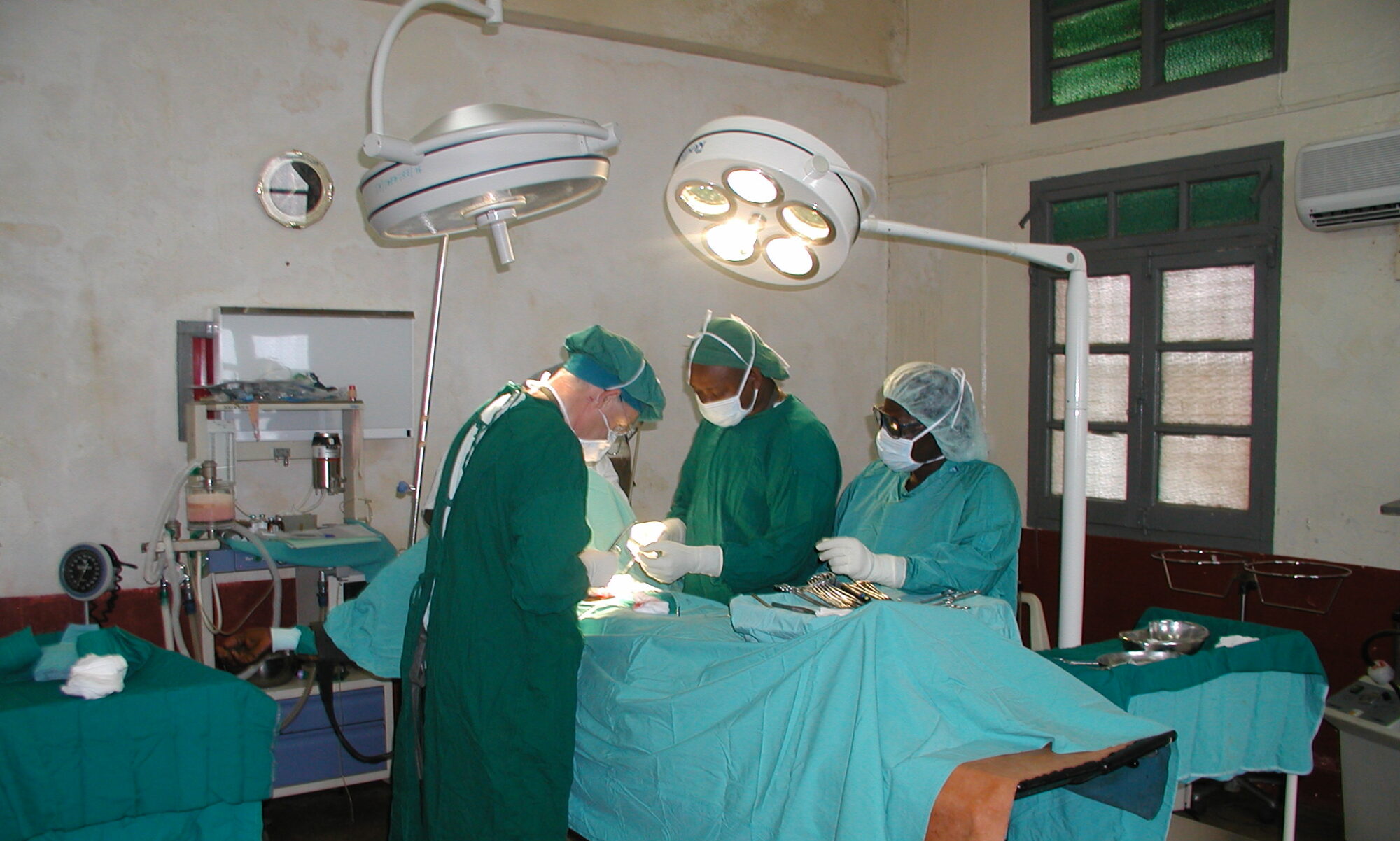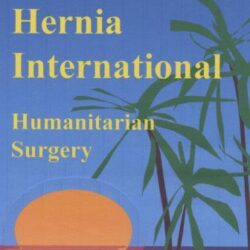
POLICE HOSPITAL CAMPAIGN REPORT – Oct 27-Nov 5 – FREETOWN, SIERRA LEONE

1. TECHNICAL REPORT:
DATES AND LOGISTICS DEVELOPED: The dates of the campaign were from 23 September to 1 October. The organisation of the campaign was easy because Dr. Paul Fillie put us in contact with the Medical Superintendent Medical Services of the hospital, Dr. John M Konteh (ASP), Resident Endocrinologist, who was quick to respond to emails and whatsapps. The director of the hospital, Dr. Mohamed Jalloh, agreed to the campaign and then all the emails went to Dr. Konteh. We sent the volunteer certificate and with it we received the invitation letter. We sent the documentation for the temporary permits from the Medical Council and John processed it without the need to go for the interview of previous years. We also got our VISA online. John booked the hotel for us, the same as on previous occasions, The Jam Lodge. Air tickets through a freelance agent of Halcon viajes (Angelis).

The material was collected by volunteers (I would like to thank the operating theatre staff of H U 12 de Octubre for helping me to collect a lot of material), and we must thank the effort made by the anaesthesiologist Rocío Armero who collected most of the anaesthetic material. Also to Dr. JM Morán Penco, a volunteer from Badajoz, who has participated in several campaigns, including the first one in Sierra Leone, and who obtained the autoclave that has been donated to the Police Hospital. We received a donation of 600 € from the Centre de Diagnosi per la imatge de Tarragona, at the initiative of Francesc Marsal.
ADULT PATIENTS: A total of 77 patients (17 women) between 11 and 75 years of age were operated on.
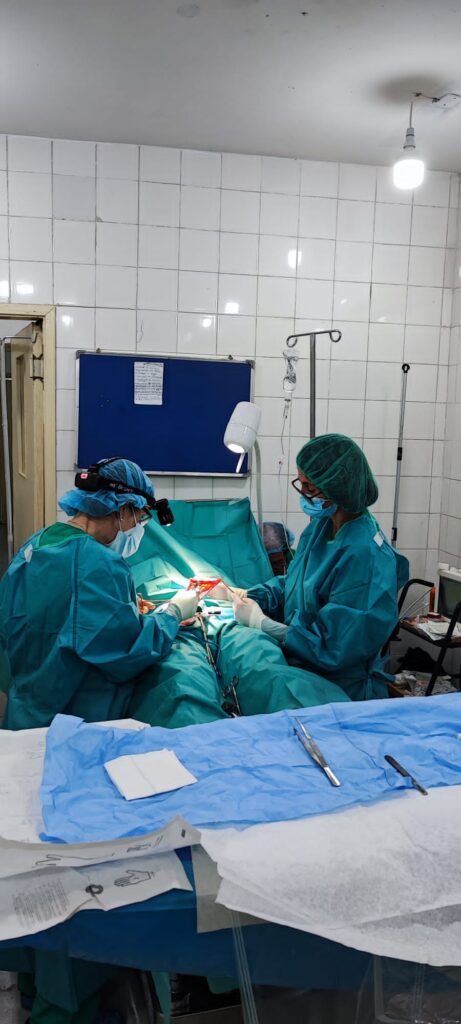
Inguinal hernias 53, recurrent 6, bilateral 4. (Lichtenstein and Want techniques)
Femoral hernia 3
Umbilical hernia 5 (recurrence 1)
Epigastric/ supra-umbilical hernia 2
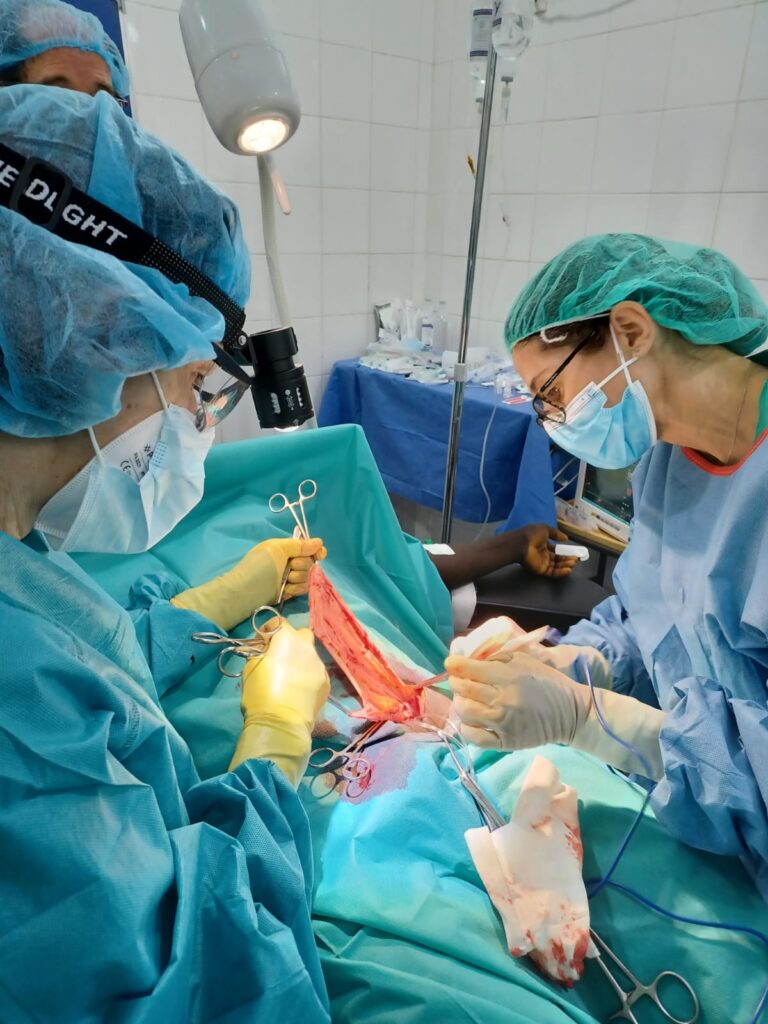
Hydroceles 4 (1 recurred)
Testicular tumour 2
Undescended testicle 1
Cord cysts 2
Lipomas 5
Facial tumour 1
Sebaceous cyst 1
Anal fistula 1
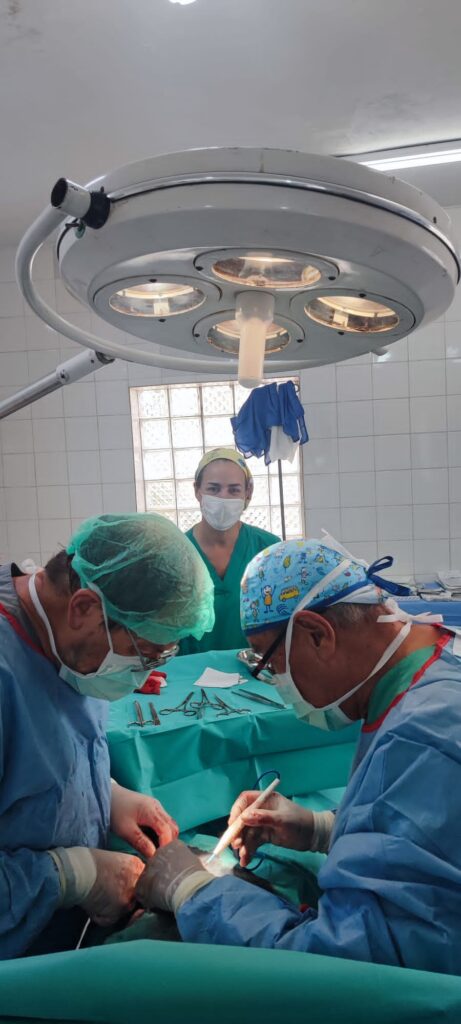
Total procedures: 81
Total patients 77
COMPLICATIONS: There were only 1 scrotal haematoma which resolved with conservative treatment.
2. CAMPAIGN REPORT
THE LOCATION: The hospital is located in the capital of Sierra Leone, Garage Road, Western area, Freetown. It is a 2-storey building that has a surgical area with 2 operating theatres, a larger one with a surgical table, standing lamp (low light), respirator (not working), O2 concentrator and scalpel generator (working), and the other smaller one with a surgical table, a photophore that was not working, a standing led lamp, scalpel generator (not working because the cable for the plate is missing), between the two, a small area for surgical washing and washing of instruments and sterilisation in a small vertical autoclave, a room where we left the material on the upper floor and 2 other rooms on the ground floor with a table for consultation (anaesthesiologist’s room) and another adjoining an operating theatre that was fitted out for eating. It has 5 hospitalisation rooms, 3 on the ground floor with 8-10 beds each for men and women, with beds with mosquito nets and a nurse’s control table, where the patients stayed after the operation. In the room on the upper floor, the patients were prepared for the operation and then brought down to the operating theatre with their IVs in place. Several consultation rooms of different sizes where on Sunday we evaluated all the patients who had been previously recruited.
THE TEAM of volunteers was made up of

– General surgeons: Teresa Butrón (team leader), Francesc Marsal, Enric J Caubet, Rocío Fernández Sánchez.
– Anaesthesiologists: Eugenio Briz, Rocío C Armero.
– Nurses: Pilar Martínez Párraga, Carme Bordoy.
LOCAL STAFF.
A team of surgical staff from the hospital was assigned to carry out the campaign.
Hospital Director, Dr. Mohamed Jalloh, provided us with a letter of invitation to conduct the campaign.
The Medical Superintendent of the hospital, Dr. John Konteh, accompanied us to the airport on arrival and departure and was always ready to help. He processed the permits from the Medical Council after we sent him the documentation. He booked the hotel for us. He was very good at recruiting patients.
Resident doctor: helped and assisted in some surgery.
Surgical area nurse supervisor: Mr. Unisa who facilitated everything and solved the problems in the daily work.
Nurses and others: Fatmata, Abdudakar, Samuel, Icanu, Anna, Francis, Mohamed, etc. All with great interest, helping and participating in everything that was done.
This year the surgical technician was absent: Mr. Kelly Jalloh who assisted in the operating theatre in 2022.

EQUIPMENT (equipment of operating theatres, surgical instruments, fungible material): This year they had improved the equipment in the operating theatres. The ceiling lights were LED, the air conditioners were working, one of the diathermy generators was working, the other lacked the cable for the plate and so we had to use one of the two generators that we brought with us, the ventilator was still not working, there was an O2 cylinder and O2 concentrator. It had a small vertical autoclave for sterilisation of the instruments; last year they brought sterilised instruments from another hospital due to the lack of their own autoclave. We brought an autoclave (Matachana type) which Dr. Caubet, accompanied by Mr. Unisa, put into operation and its proper functioning was checked with the control strips that were placed inside. This autoclave was donated to the hospital (we and they are grateful to Dr. JM Morán for obtaining it).
There are enough instruments to make several hernia kits. There is a lack of suitable separators. The nurses, together with the local staff, made kits for hernias and other pathologies, so that the kits were optimised to fit the pathology for which they would be used and the packages were checked as they were prepared.

ANAESTHESIA regional and local anaesthesia with sedation was performed, only 2 patients had to be put to sleep due to pain/bleeding, as local anaesthesia and sedation was not sufficient. All the material was carried by the volunteers, as anaesthetic material is lacking or scarce in the hospital.
ASEPSIA AND SURGICAL MATERIALS the hospital has a small vertical autoclave and all instruments are washed and prepared in packages to be sterilised there. This meant that this year the kit was always available and a greater number of patients could be operated on each day.
OUR LIFE: We had left the day before from Barcelona (Francesc, Enric and Carme) and the rest from Madrid; Roberto, Faustino Santisteban’s nephew, brought us some of the material (6 large packages including an autoclave and 2 electric scalpel generators). The whole team of volunteers met in Casablanca and from there we flew together to Freetown. Dr. Konteh was waiting for us at Freetown airport, before we picked up all our luggage and went through passport control (an anecdote is that some of them were asked for dollars / euros, we didn’t have to give in and give as the VISA is paid through the Internet). Dr. Konteh arranged for us not to pay a security fee of 25 dollars that has been introduced this year when entering and leaving Sierra Leone. It should be noted that the international airport is new, it was under construction last year. With all our luggage we went to take the fast ferry (Seacoach) at a cost of 45 dollars per person (we used the money donated for the campaign) and after the crossing, we were welcomed at the port with a big sign announcing the free campaign and a bouquet of flowers. We all travelled to our hotel, The Jam Lodge, in a police van driven by Samuel, a policeman who had accompanied us throughout the campaign and who was Dr. Konteh’s assistant. After a short rest, shower and light breakfast, we drove to the hospital where all the equipment had been brought. The nurses tidied up and the rest of us set about seeing all the recruited patients waiting in the hospital courtyard and finally preparing the surgical schedules for the following days.
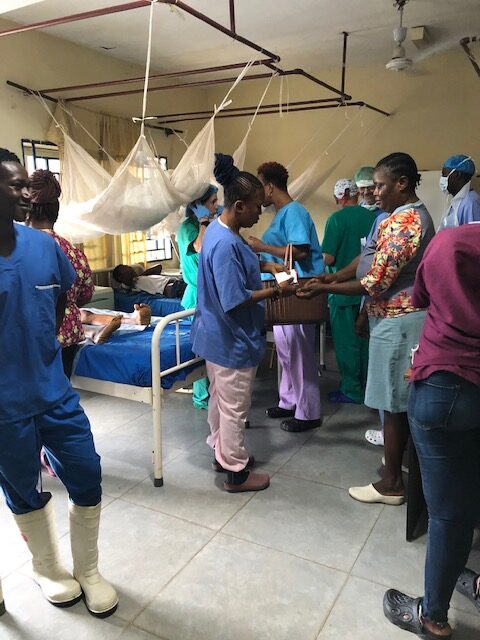
On Monday at 8 am we went to the Police Headquarters where we were received at the official ceremony by the Inspector General of Police William Fayia Sellu, with the presence of the media who recorded everything with the words of him, Dr. Konteh and us who referred to the campaign and the donation of the autoclave, we were also interviewed and the news of the campaign appeared on the news.
Our daily routine from 25-30 September was breakfast at the hotel at 7:00. Transfer to the hospital where we changed and the anaesthesiologists and nurses prepared the operating theatre and the surgeons (with one of the nurses and local staff) visited the patients who had remained from the previous day. We would start operating in the large operating theatre and the smaller one in the established order, with a photophore in the latter and sometimes in the other. We ate in an adjoining room, food brought by a lady from there, based on pasta, rice, fish or chicken, spices and water. Between operations, we would occasionally assess patients and they would be included in the report. In general, every day the schedules was not completed because of a longer operation, and the next day we would start with those patients. The simplest pathology (lipomas) were scheduled for the last day and this meant that all the patients seen were operated on except for 4-5 patients with small lipomas.

The activities after finishing sometimes late, focused on the dinner at the hotel, 2 days with charcuterie, cheese and scoldings that Kiko brought and in one of them were John Konteh and Samuel. On the last night, Friday, we had a tour of the beach and tourist district, there were checkpoints and it was very crowded, it was late and we returned to the hotel. On Saturday morning the 30th we visited the remaining patients and collected all the material: we packed the diathermy generator and some of the anaesthetic material that was not going to be used there. We said goodbye to all the staff. Dr. J Konteh and Samuel gave us a daytime tour of the beach, a souvenir shop, lunch at a local restaurant and finally we went to a handicraft market and had some rest at the hotel before we were picked up again. We went to the hotel where the official farewell dinner was to be held from 7pm until after 9pm, presided over by the Inspector General of Police William Fayia Sellu and all the staff we had worked with. There we had a plentiful dinner with different starters and skewers of meat and fish, they thanked us and gave us a plaque and several personalized gifts, they invited us to do more campaigns and told us that they were going to improve the operating rooms to operate on children and other pathologies such as goiters, finally the dance, we all danced and the last dance was with the Inspector General. It was all very emotional and a good end to the campaign. At 11 pm we were picked up at the hotel to go to the ferry&water to the airport. We told Dr. Konteh that there was no need for him to accompany us, he told us to call him from there and we did so because of a small inconvenience with the departure security fee of 25 dollars, the exemption letter had not arrived. It was all over with the objectives achieved.

3. CONCLUSION
Strengths of this place: location in the capital. Willingness of all local staff at all levels to help and solve problems if they arise. Security as it is a police hospital and they provide transport and permanent accompaniment. Good patient recruitment.
Objectives for improvement: Equip the operating theatres: improvement of lighting, plate cable of a diathermy generator, fix the respirator if they want us to operate on goitres and children. Adjusting the kits to the pathology to be operated on so that there is a greater number and more patients can be operated on in a day.
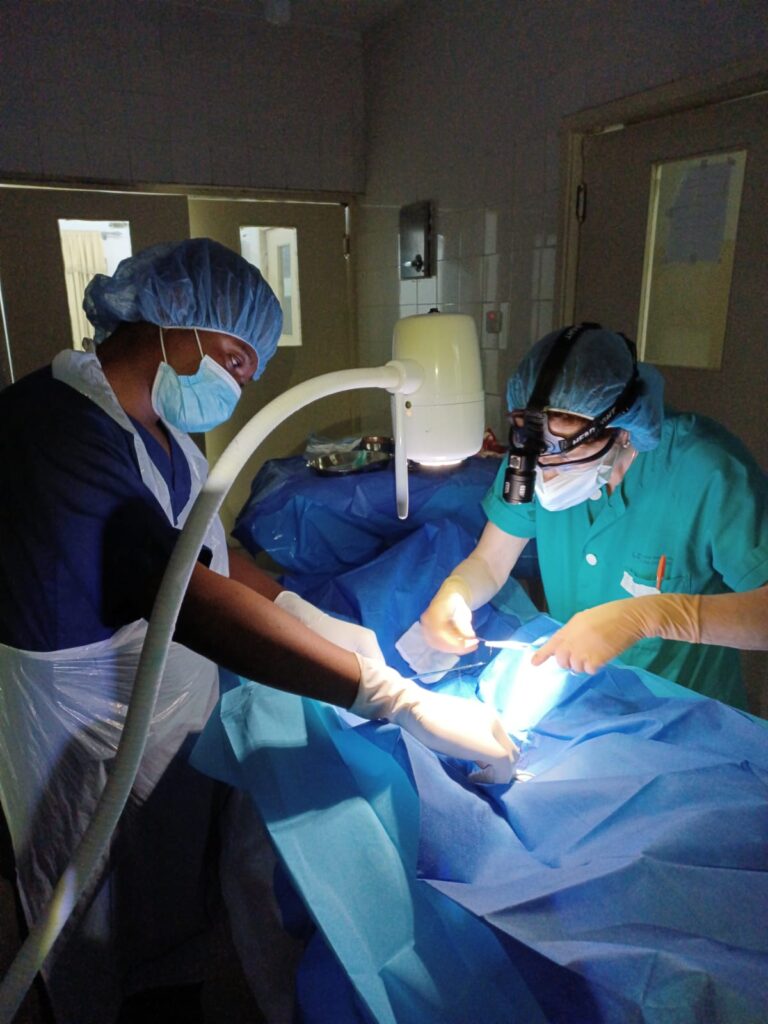
Optimisation of time: Involve all staff so that there is synchronisation and preparation and time between patients is reduced.
4. BUDGET:
COST PER PARTICIPANT: Air ticket 800 € + Hotel single 450 €, double 350 € + meals and ferry airport: 140 € + VISA 80 € = 1470- 1370 €.
TOTAL COST OF THE CAMPAIGN: 8 volunteers: 11.500 €.
+ cost of medical supplies.
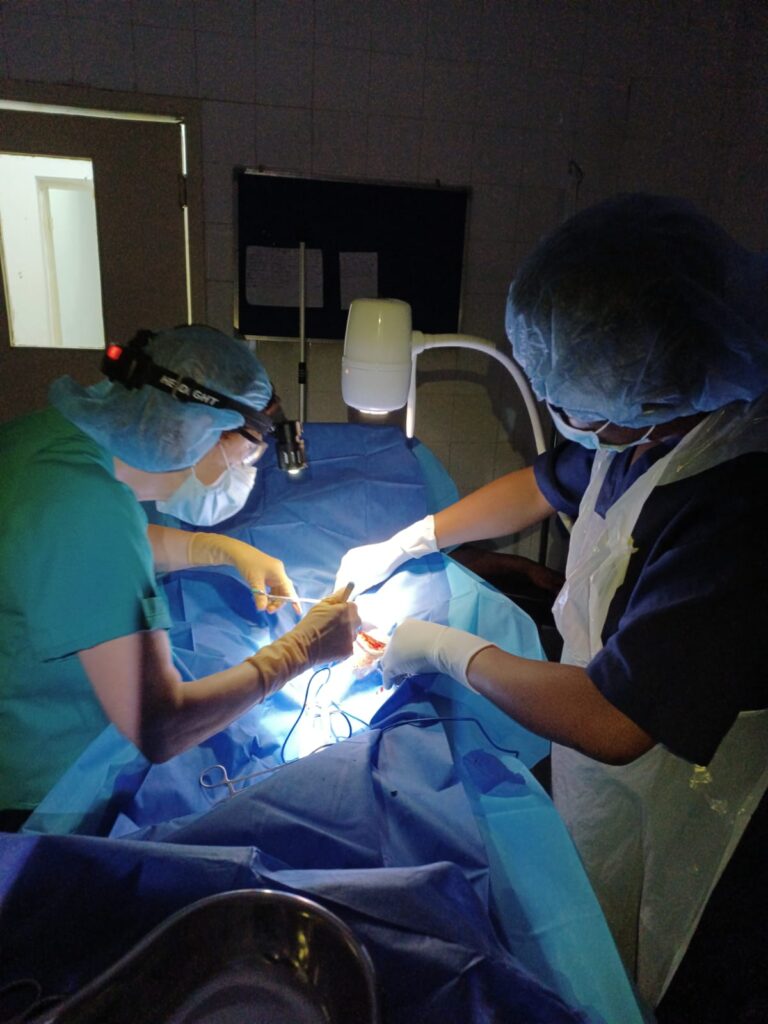
Teresa Butrón
Team Leader
Surgeons in Action/ Hernia International
